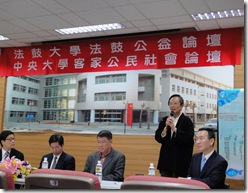By Leemen Lee
Political Economy, and Institute of Government and Law of National Central University. Prof. Liu An-Chi, President of DDU, Prof. Jiang Ming-hsiu, Dean of College of Hakka Studies of NCU, along with almost fifty participants were in attendance.
Prof. Chan Kin-man, Director of the Center for Civil Society Studies at the Chinese University of Hong Kong gave a keynote speech for the forum. Prof. Chan highlighted that NGOs reacted far more effectively and efficiently during the 2008 Sichuan earthquake than the 2003 SARS outbreak in Chine in terms of civic involvement, scale and scope of service programs, inter-organizational collaborative platforms, and program continuity, etc. One reason might be the different nature of the disasters. However, the statistics have shown that the civic society in China has developed considerably during the last few years. The driving forces behind the Chinese civil society development, as Prof. Chan pointed out, did not come from the government. Rather, it’s mainly due to the awakening of Chinese entrepreneurs who benefitted by the positive influence of the global civil society (including Hong Kong and Taiwan) and became more socially engaged in the public sphere.
Prof. Chan observed that the Chinese government adopted the “Management by Categories” strategy that gives more room for service-oriented organizations to grow but strictly limits the establishment and activities of cross-regional or advocacy-oriented organizations. Prof. Chan pointed out that local government officers tend to calculate the political benefits and risks of NGOs’ activities, and those involved in cross-regional activities and with international connections, such as the National Alliance of Psychological Relief, often became targets of political oppression.
Prof. Sun Way, chair of Institute of Government and Law, emphasized the importance to institutionalize the collaborative networks formed during the disaster relief. Prof. Chen Ding-min highlighted that a number of passionate young Chinese scholars are leading the transformation and development of Chinese civil society. Prof. Sun Chi-Pen (Center for General Education at National Chiao Tung University) pointed out that nationalism is a critical factor affecting the path of Chinese civil society.
Ms. Lin Shu-er, director of Taiwan Thinktank, suggested that regulatory advancement such as tax exempt arrangements may provide incentives for more tri-regional collaboration for civil society development. Prof.Yang Pei of DDU discussed the role of government in supervising and supporting grassroots organizations, and Prof. Lee Leemen shared that young people may integrate personal careers with social mission through their participation in civil society activities.
An exchange student from Chong Qing University asked a question of how to build a civil society based on tolerance. Prof. Chan emphasized that “tolerance” is not only built on a political system that encourages and protects freedom of speech, but also built on the citizens’ attitudes and abilities to be able to truly listen to one another. Different from arguing and commanding, creative dialogue requires a genuine willingness to listen. And, as Prof. Chan concluded, genuine dialogue fosters citizenship, the most crucial element of civil society.



0 意見:
張貼留言